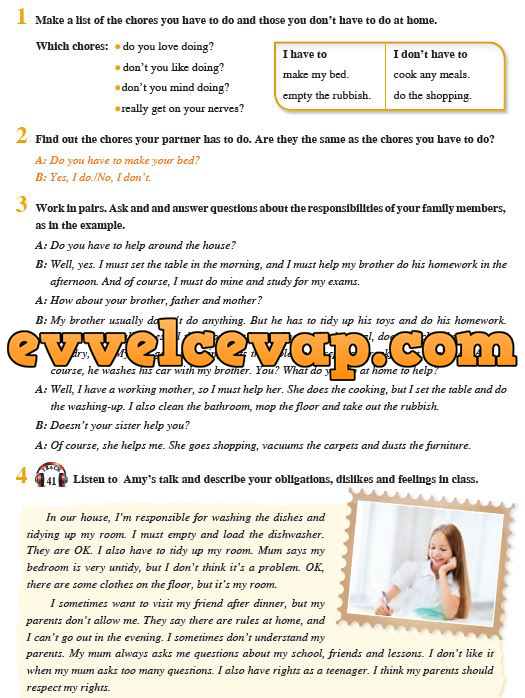Değerli öğrencilerimiz Tutku yayınları 8. Sınıf İngilizce ders kitabının tamamı sayfalarının cevapları sayfamızda yer almaya devam ediyor. Eğitim bireyin davranışlarında kendi yaşantısı yoluyla ve amaçlı olarak istenen değişiklikleri meydana getirme sürecidir. Birçok bilim dalının ihtiyaç duyduğu alanlardan biri olan Aradığınız kitabın ilgili sayfasının çözümleri aşağıda yer almaktadır. Eğer doğru sayfayı görmüyorsanız muhtemelen çözümü henüz yapılmamıştır. Fakat günlük hayatımızın akışı içerisinde birçok öğrenci verimli ders nasıl çalışılır tam olarak bilmemektedir. Yanlış yollara başvuran öğrenci tam olarak ne istediğini alamamakla beraber ders konusunda kendisini yetersiz görebiliyor. Böyle durumlarla karşılaşan öğrencilere mümkün olduğunca velililerinde destek olarak ders çalışabilmesine de en iyi şekilde katkı sağlaması gerekmektedir.
Okul dönemi boyunca tüm derslerinizde işinize yarayacak ders kitabı cevaplarını yanıtlamayı sürdürüyoruz. Eğer ilgili sayfanın cevaplarını göremiyorsanız bu sayfa muhtemelen çözülmemiştir. Bu durumda kısa bir süre sonra sitemizi yeniden ziyaret ediniz. Öğrencilerimize tavsiyemiz buradaki cevapları kitaplarına geçirmeden önce kendiniz yapıp burayı sadece kontrol amaçlı kullanmanızdır. Herkese okullarında başarılar diliyoruz.
Sayfanın Cevapları:
8. Sınıf Tutku Yayınları İngilizce Ders Kitabı Sayfa 89 Cevabı 2017 – 2018 Yeni Müfredat

8. Sınıf Tutku Yayıncılık İngilizce Ders Kitabı Sayfa 89 Cevabı
Make a list of the chores you have to do and those you don’t have to do at home.
Which chores: • do you love doing?
• don’t you like doing?
• don’t you mind doing?
• really get on your nerves?
Find out the chores your partner has to do. Are they the same as the chores you have to do?
A: Do you have to make your bed?
B: Yes, Ido./No, Idon’t.
Work in pairs. Ask and and answer questions about the responsibilities of your family members,
as in the example.
A: Do you have to help around the house?
B: Well, yes. I must set the table in the morning, and I must help my brother do his homework in the afternoon. And of course, I must do mine and study for my exams.
A: How about your brother, father and mother?
B: My brother usually doesn’t do anything. But he has to tidy up his toys and do his homework. My mum generally does all the chores at home. She cooks the meal, does the cleaning, does the laundry, etc. My dad goes shopping, sets the table and prepares breakfast at weekends. And of course, he washes his car with my brother. You? What do you do at home to help?
A: Well, I have a working mother, so I must help her. She does the cooking, but I set the table and do the washing-up. I also clean the bathroom, mop the floor and take out the rubbish.
B: Doesn’t your sister help you?
A: Of course, she helps me. She goes shopping, vacuums the carpets and dusts the furniture.
41 li; Listen to Amy’s talk and describe your obligations, dislikes and feelings in class.
In our house, I’m responsible for washing the dishes and tidying up my room. I must empty and load the dishwasher.
They are OK. I also have to tidy up my room. Mum says my bedroom is very untidy, but I don’t think it’s a problem. OK, there are some clothes on the floor, but it’s my room.
I sometimes want to visit my friend after dinner, but my parents don’t allow me. They say there are rules at home, and I can’t go out in the evening. I sometimes don’t unclerstancl my parents. My mum always asks me questions about my school, friends and lessons. I don’t like it when my mum asks too many questions. I also have rights as a teenager. I think my parents should respect my rights.